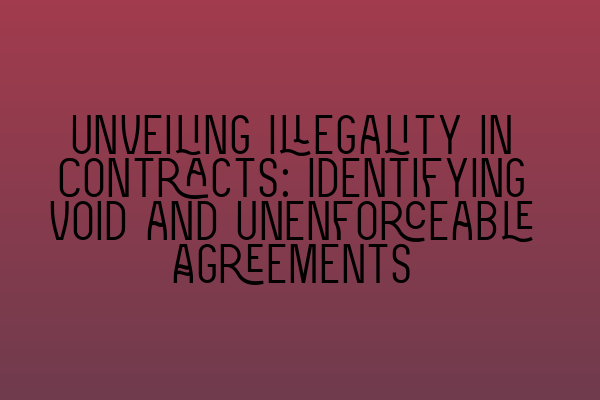Unveiling Illegality in Contracts: Identifying Void and Unenforceable Agreements
In the complex world of contract law, it is essential to understand the concept of illegality when entering into agreements. Illegality refers to contracts that are considered void or unenforceable due to their nature or content. As a solicitor, it is crucial to be able to identify and advise clients on the potential pitfalls and consequences of entering into such agreements.
What is an Illegal Contract?
An illegal contract is one that violates the law or public policy. These agreements are considered void ab initio, meaning they are null and void from the beginning, as if they never existed. Parties to an illegal contract are not entitled to enforce their rights or claim any remedies under the contract.
There are various types of illegal contracts, including those that involve criminal activity, fraudulent misrepresentation, or contracts that are against public policy. For example, a contract to commit a crime, such as drug trafficking, would be classified as an illegal contract. Similarly, a contract that involves fraud or misrepresentation, such as selling counterfeit goods, would also be considered illegal.
Unenforceable Contracts
Unlike illegal contracts, unenforceable contracts are not inherently void; however, they cannot be enforced by a court of law for various reasons. These reasons may include procedural deficiencies, breaches of statutory requirements, or agreements considered unconscionable.
One common example of an unenforceable contract is an oral agreement for the sale of land. In many jurisdictions, such agreements are required to be in writing to be enforceable. If the parties enter into an oral agreement for the sale of land, they will not be able to enforce the agreement if a dispute arises.
Another example of an unenforceable contract is a contract that violates a statute of frauds requirement. Statutes of frauds require certain types of contracts, such as those involving the sale of goods over a certain value or the guarantee of another person’s debt, to be in writing and signed by the parties. If these requirements are not met, the contract becomes unenforceable.
Identifying Illegal or Unenforceable Contracts
As a solicitor, it is vital to have a thorough understanding of the law and the ability to identify illegal or unenforceable contracts. Here are a few key factors to consider:
- Review the contract: Carefully examine the terms and conditions of the contract to identify any potential illegalities or unenforceable elements. Look for clauses that might violate the law or public policy, such as agreements to commit illegal acts or excessively one-sided terms.
- Research applicable laws: Conduct thorough research on relevant statutes, regulations, and case law that may impact the legality or enforceability of the contract. Stay updated with recent legal developments to provide accurate advice.
- Consult with experts: If you are uncertain about the legality or enforceability of a contract, consult with other legal experts or seek specialist advice to ensure a comprehensive understanding of the situation.
- Advise your clients: Once you have identified an illegal or unenforceable contract, it is your duty to inform your client about the risks and potential consequences. Offer alternative solutions, such as renegotiating terms or terminating the agreement, to mitigate these risks.
Conclusion
Understanding and identifying illegal or unenforceable contracts is essential for solicitors practicing contract law. By staying informed about relevant laws and keeping a watchful eye on the terms and conditions of contracts, you can effectively protect your clients’ interests and ensure compliance with the law. Remember, thorough analysis, research, and consultation are key to providing effective legal advice in this complex area of law.
For further preparation and guidance on contract law and other legal topics, we recommend checking out the following related articles:
